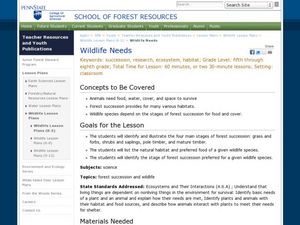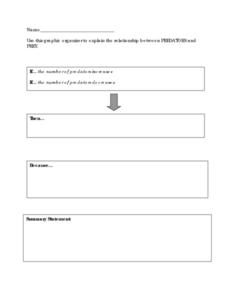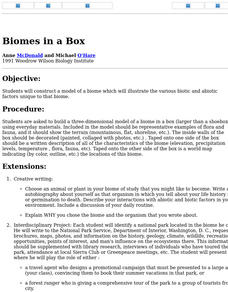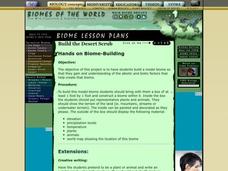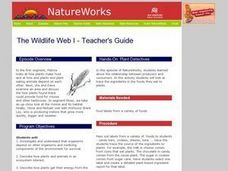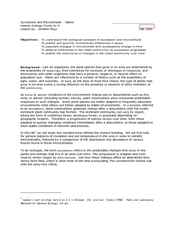Curated OER
Ecology Vocabulary
In this ecology worksheet, students read the vocabulary words and then categorize a species found in a field, meadow, or fencerow in their state or region. Students complete 6 problems.
Curated OER
Wildlife Needs
Students identify the wildlife needs in a specific setting. In this wildlife needs lesson, students identify and illustrate the four stages of forest succession. Students list the natural habitat and food for a given species. Students...
Curated OER
Amazon Rainforest
Seventh graders complete a simulation in which they travel through the Amazon rainforest. Using their map skills, they determine the best route and where to see specific plants and animals. They develop their own database to organize...
Curated OER
Predators and Prey
Students explain how the food chain works. They contrast predators with prey and describe their function in nature. Students discuss how the food chain aids in keeping nature balanced. In small groups, they play a game that simulates the...
Curated OER
Outdoor Survival
Young scholars are introduced to basic outdoor survival concepts. They identify the seven basic needs for survival. Students describe the symptoms and treatment for frostbite and hypothermia. They compare and contrast the value of...
Curated OER
Wildlife Habitat
Students examine habitats and describe their elements. For this wildlife habitat lesson students study the factors that affect habitat and write a short report.
Curated OER
Everything in Its Place: Science Classification
Students investigate the system of classification for living things through the sixteen lessons of this unit. The five kingdoms of monerans, protists, fungi, plants, and animals form the basis of several experiments as the similarities...
Curated OER
Food Web Follies
Seventh graders cut and paste animal pictures to create a food web and trace the path of energy. They write a paragraph explaining the importance of photosynthesis in all food webs.
Curated OER
Prairies
Students identify the basic characteristics of the prairie ecosystem, and several commonly known prairie species. They create a classroom mural of a prairie ecosystem; and create reports about what they have found out.
Curated OER
The Great Continental Drift Mystery
Students stud the concept of Pangaea by using Wegener's clues to construct a map of the continents joined together. They determine how fossil distribution can be used to enhance the study of continental drift. They locate the...
Curated OER
Biomes in a Box
Students construct a three-dimensional model of a biome which illustrates the various biotic and abiotic factors unique to that biome. They use everday materials to represent the important characteristics of a particular biome and then...
Curated OER
What Does Life Look Like Under a Microscope?
Young scholars discover cells make up all living things. In this life science lesson plan, students investigate living organisms and the cells that create them. Finally the young scholars create a testable question, conduct an...
Curated OER
Dinosaurs 1: Where Are the Dinosaurs?
Young scholars explore dinosaurs. In this dinosaur identification instructional activity, students watch video clips for different dinosaurs from the Discovery Kids website. Young scholars discuss the clips with their teacher. Students...
Curated OER
Hands On Biome-Building
Students create a model biome to understand the abiotic and biotic factors that go into creating a biome. In this biomes lesson plan, students should display plants, animals, temperature, precipitation, and more.
Curated OER
Hands on Biome--Building
Students create a model biome. In this ecology instructional activity, students use materials to create a model biome. There is an extension activity that allows students to write about plants and animals and their specific biome.
Curated OER
Build the Taiga: Hands on Biome-Building
Students explore environmental awareness by completing a construction project. In this biomes lesson, students identify the different elements for life to thrive in an ecosystem. Students utilize a cardboard or wood box to create a biome...
Curated OER
Build the Arctic Tundra
Students build a model of biome in order to comprehend the abiotic and biotic factors that are prevalent in a biome. In this hands on building lesson, students use a box to build a biome. . Students decorate the inside and...
Curated OER
Hands On Biome-Building
Students create a desert biome to understand the abiotic and biotic factors of that biome. In this desert biome lesson plan, students include elevation, precipitation, temperature, plants, and more.
Curated OER
Sea Connections: Marine Ecosystems
Students identify producers and consumers from marine ecosystems and describe the balance among them in the environments. After constructing a food chain from a marine ecosystem, they examine human activities that can upset the balance...
Curated OER
Collecting Compost
Students observe a composting box. In this soil lesson plan, students create a composting bin by using a bin, newspaper, worms, and food scraps. Students create a composting food web.
Curated OER
This Is Tree-rific!
Third graders view a clip of the video Backyard Safari, "Trees," and portray the life cycle of a tree. They also view a clip on structures of a tree and draw a diagram of a tree in their science journals.
Curated OER
The Wildlife Web I
Students explore the relationship between producers and consumers. In this activity, they trace the ingredients in the foods they eat to plants. Supplement to Natureworks episode from New Hampshire Public Television, but activities may...
Curated OER
Succession and Microclimate
Young scholars compare the population of insects in different microclimates. In this biology lesson, students collect data using probes to tabulate temperature and soil data. They predict how certain parameters change as an area...
Curated OER
Bugsicles (A Frozen Insect Larva You can Find!)
Students explore how animals survive in the winder. After attending a gall-collecting field trip, students place them in a freezer. Once frozen, the students open the gall flay larva and observe it as the larva revives. Students...

